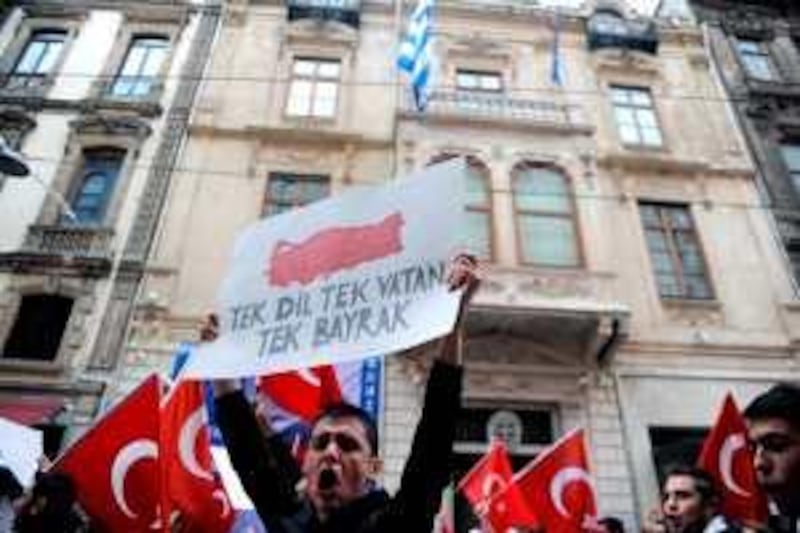ISTANBUL // For him, it was just a joke, maybe a bad one, but one for which he has duly apologised. For her, it was pure racism that must not go unpunished. A high-profile and bitter dispute between a Turkish columnist and a Kurdish singer over alleged racist remarks has exposed deep divisions that run through this country as it tries to settle the Kurdish conflict peacefully. Efforts by the government to bring Kurdish rebels down from the mountains with amnesty offers and democratic reforms have angered Turkish nationalists, while many of Turkey's 12 million Kurds feel insulted by what they see as a tendency by the majority to look down upon them.
The row started last month when Serdar Turgut, editor of the Aksam newspaper, wrote a column titled "I am sorry I have not become a PKK terrorist", in which he wondered what life would have been like as a rebel of the Kurdistan Workers' Party, or PKK, which took up arms against Ankara in 1984. Using a satirical style, Turgut wrote that the rebels led a happy and carefree life in the mountains and that, far from being persecuted, PKK leaders were now courted by the state. "My being a Turk has not done me any good, just like my not becoming a terrorist has done me harm," Turgut concluded.
At several points in the column, Turgut mentioned the Kurdish singer Rojin, who has become a national celebrity after hosting a daily show on TRT-6, the country's first state-run Kurdish television channel, which started broadcasting in January. Although she left TRT-6 a few months ago, Rojin is one of the most famous Kurdish artists in the country. Turgut wrote that as a PKK militant he would have brought Rojin "as a sex slave" to his hideout.
The singer responded by filing criminal charges against Turgut for insulting her, as well as a civil case, demanding 100,000 lira (Dh245,000) in damages. Turgut apologised to Rojin in another column a few days later, but the artist refused to accept it. "What he did is no joke," Rojin told the Hurriyet daily last week. "Turgut's article should be read correctly and in full. It is full of rage against the peace process and against Kurds; it is a racist article." She asked her interviewer whether she thought it possible that Turgut would direct the same sort of remarks against a Turkish singer. "He insults my ethnic identity and my being a woman."
Many Kurds feel like second-class citizens and say they are discriminated against daily. A poll last weekend said 61 per cent of Kurdish university students in Turkey say they are the victims of constant or occasional discrimination. Other polls have said Kurdish children spend less time in schools than Turkish ones and that only 40 per cent of Kurds over 15 have a job. Players and fans of a football club in Diyarbakir, the main city in Turkey's Kurdish region, have been met with so many shouts of "PKK go home" during matches in cities outside the Kurdish area that the club has threatened to leave the country's first football league. Last year, clashes between Turks and Kurds in the western Turkish town of Altinova left two people dead.
Those incidents made headlines throughout the country, but Nagehan Alci, a writer in Turgut's Aksam newspaper, pointed out that some of the discriminations that Kurds complain about may not even be noticed by most Turks. Several days after Turgut's article appeared, Alci told her readers in a column that her Turkish computer programme identified "Rojin" as a foreign word by underlining it. "If you say that is because it is not Turkish, you are mistaken. For example, it does not underline 'Nagehan'. But 'Nagehan' is Persian."
To understand Rojin's reaction to Turgut's article, Turks should put themselves into a position of someone "who is in our midst, but left out", Alci wrote. For many Turkish nationalists, efforts by Recep Tayyip Erdogan, the prime minister, to end the conflict by giving Kurds more rights sound like treason. "The PKK does not have to turn to terror any more," Devlet Bahceli, leader of the right-wing Nationalist Movement Party, said last month, because Mr Erdogan "gives voice to all their demands".
In a development likely to trigger even more criticism, Turkish media reported yesterday that Ankara was preparing to end solitary confinement for the PKK leader, Abdullah Ocalan. According to the reports, eight PKK inmates from other prisons are to be transferred within days to the prison island of Imrali near Istanbul, where Ocalan has been serving a life sentence since 1999. Ocalan will also get a television set for his cell, the reports said. Improving prison conditions for Ocalan has been a long-standing demand of Kurdish activists.
@Email:tseibert@thenational.ae






